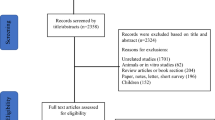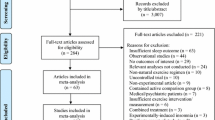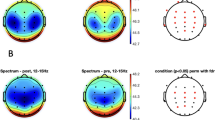Abstract
Subjective sleep quality is an individual’s subjective sleep feeling, and its effective evaluation is the premise of improving sleep quality. However, people with autism or mental disorders often experience difficulties in verbally expressing their subjective sleep quality. To solve the above problem, this study provides a non-verbal and convenient brain feature to assess subjective sleep quality. Reportedly, microstates are often used to characterize the patterns of functional brain activity in humans. The occurrence frequency of microstate class D is an important feature in the insomnia population. We therefore hypothesize that the occurrence frequency of microstate class D is a physiological indicator of subjective sleep quality. To test this hypothesis, we recruited college students from China as participants [N = 61, mean age = 20.84 years]. The Chinese version of the Pittsburgh Sleep Quality Index scale was used to measure subjective sleep quality and habitual sleep efficiency, and the state characteristics of the brain at this time were assessed using closed eyes resting-state brain microstate class D. The occurrence frequency of EEG microstate class D was positively associated with subjective sleep quality (r = 0.32, p < 0.05). Further analysis of the moderating effect showed that the occurrence frequency of microstate class D was significantly and positively correlated with subjective sleep quality in the high habitual sleep efficiency group. However, the relationship was not significant in the low sleep efficiency group (βsimple = 0.63, p < 0.001). This study shows that the occurrence frequency of microstate class D is a physiological indicator of assessing subjective sleep quality levels in the high sleep efficiency group. This study provides brain features for assessing subjective sleep quality of people with autism and mental disorders who cannot effectively describe their subjective feelings.


Similar content being viewed by others
Data Availability
The datasets generated during and/or analysed during the current study are available from the corresponding author on reasonable request.
References
Åkerstedt T, Hume KE, Minors D, Waterhouse JI (1994) The meaning of good sleep: a longitudinal study of polysomnography and subjective sleep quality. J Sleep Res 3:152–158
Boeve A, Halpin A, Michaud S, Fagan M, MacAulay RK (2022) Specific Sleep Health Domains as predictors of executive function in older adults. J Neuropsychiatry Clin Neurosci 34:4. https://doi.org/10.1176/APPI.NEUROPSYCH.21040112
Brandeis D, Lehmann D, Michel CM,Mingrone W (1995) Mapping event-related brain potential microstates to sentence endings. Brain Topogr 8:145–159. https://doi.org/10.1007/bf01199778
Britz J, Ville D, Michel CM (2010) Bold correlates of EEG topography reveal rapid resting-state network dynamics. NeuroImage 52:1162–1170. https://doi.org/10.1016/j.neuroimage.2010.02.052
Buysse DJ, Reynolds CF, Monk TH, Berman SR, Kupfer DJ (1989) The Pittsburgh sleep quality index: a new instrument for psychiatric practice and research. Psychiatry Res 28:193–213. https://doi.org/10.1016/0165-1781(89)90047-4
Chen LX, Ji DH, Fei JH, Zhang HY (2015) Advances in sleep assessment in ICU patients. Adv Nurs Pract 12:4
Corbetta M, Shulman GL (2002) Control of goal-directed and stimulus-driven attention in the brain. Nat Rev Neurosci 3:201. https://doi.org/10.1038/nrn755
Dana S, Rik S, Angelos A, Nic JAW, Willem Does, Peter P (2018) The effects of caffeine on threat-selective attention moderated by EEG theta/beta ratio. Int J Psychophysiol 131:35. https://doi.org/10.1016/j.ijpsycho.2018.07.109
Delorme A, Makeig S (2004) EEGLAB: an open source toolbox for analysis of single-trial EEG dynamics including independent component analysis. J Neurosci Methods 134:9–21. https://doi.org/10.1016/j.jneumeth.2003.10.009
Diaz Hernandez L, Rieger K, Baenninger A, Brandeis D, Koenig T (2016) Towards using microstate-neurofeedback for the treatment of psychotic symptoms in Schizophrenia. A feasibility study in healthy participants. Brain Topogr 29:2. https://doi.org/10.1007/s10548-015-0460-4
Dimitri VD, Juliane B, Christoph M (2010) EEG microstate sequences in healthy humans at rest reveal scale-free dynamics. Proc Natl Acad Sci USA 107:18179–18184. https://doi.org/10.1073/pnas.1007841107
Du QX, Qian Y, Wang YF (2010) Reliability and validity of Behavior Rating Inventory of executive function-adult version self-rating scale. Chin Mental Health J 9:674–679
Escalona A, Escalona A, Field T, Singer-Strunck R, Cullen C, Hartshorn K (2001) Brief report: improvements in the behavior of children with autism following massage therapy. J Autism Dev Disord 31(5):513–516. https://doi.org/10.1023/A:1012273110194
Gumenyuk V, Roth T, Korzyukov O, Jefferson C, Bowyer S, Drake CL (2011) Habitual short sleep impacts frontal switch mechanism in attention to novelty. Sleep 34:12. https://doi.org/10.5665/sleep.1430
Hampson M, Driesen NR, Skudlarski P, Gore JC, Constable RT (2006) Brain connectivity related to working memory performance. J Neurosci Official J Soc Neurosci 26(51):13338–13343. https://doi.org/10.1523/jneurosci.3408-06.2006
Harvey AG, Kathleen S, Whitaker KL, Damian M, Harvinder V (2008) The subjective meaning of sleep quality: a comparison of individuals with and without insomnia. Sleep 31(3):383. https://doi.org/10.1093/SLEEP/31.3.383
Hayes J (2018) Process models of change. The theory and practice of change management
Hu L, Zhang Z (2019) Microstate Analysis. EEG Signal Processing and Feature Extraction
Jackowska JM, Dockray S, Hendrickx H, Steptoe A (2011) Psychosocial factors and sleep efficiency: discrepancies between subjective and objective evaluations of sleep. Psychosom Med 73(9):810. https://doi.org/10.1097/PSY.0b013e3182359e77
Jung DW, Lee YJ, Jeong DU, Park KS (2017) New predictors of sleep efficiency. Chronobiol Int 34:93–104. https://doi.org/10.1080/07420528.2016.1241802
Kelly AMC, Uddin LQ, Biswal BB, Castellanos FX, Milham MP (2008) Competition between functional brain networks mediates behavioral variability. NeuroImage 39(1):527–537. https://doi.org/10.1016/j.neuroimage.2007.08.008
Keshavan MS, Reynolds CF, Kupfer DJ (1990) Electroencephalographic sleep in schizophrenia: a critical review. Compr Psychiatr 31(1):34–47. https://doi.org/10.1016/0010-440X(90)90052-T
Khanna A, Pascual-Leone A, Michel CM, Farzan F (2015) Microstates in resting-state EEG: current status and future directions. Neurosci Biobehav Rev 49:105–113. https://doi.org/10.1016/j.neubiorev.2014.12.010
Kredlow MA, Capozzoli MC, Hearon BA, Calkins AW, Otto MW (2015) The effects of physical activity on sleep: a meta-analytic review. J Behav Med 38(3):427–449. https://doi.org/10.1007/s10865-015-9617-6
Lee TW, Girolami M, Sejnowski TJ (1999) Independent component analysis using an extended infomax algorithm for mixed subgaussian and supergaussian sources. Neural Comput 11:417. https://doi.org/10.1162/089976699300016719
Lehmann D, Ozaki H, Pal I (1987) EEG alpha map series: brain micro-states by space-oriented adaptive segmentation. Electroencephalography and clinical neurophysiology 1987, 67:288. https://doi.org/10.1016/0013-4694(87)90025-3
Li L, Yu Q, Zhao W, Herold F, Cheval B, Kong Z et al (2021) Physical activity and inhibitory control: the mediating role of sleep quality and sleep efficiency. Brain Sci 11. https://doi.org/10.20944/preprints202105.0181.v1
Lim J, Tan JC, Parimal S, Chee Michael WL (2010) Sleep deprivation impairs object-selective attention: a view from the ventral visual cortex. PLoS ONE 5:2. https://doi.org/10.1371/journal.pone.0009087
Luca PT, Ken KD, Scott M (2019) ICLabel: an automated electroencephalographic independent component classifier, dataset, and website. NeuroImage 198:181–197. https://doi.org/10.1016/j.neuroimage.2019.05.026
Morin CM, Bootzin RR, Buysse DJ, Lichstein KL (2006) Psychological and behavioral treatment of insomnia:update of the recent evidence (1998–2004). Sleep 29:11. https://doi.org/10.1093/sleep/29.11.1398
Musso F, Brinkmeyer J, Mobascher A, Warbrick T, Winterer G (2010) Spontaneous brain activity and EEG microstates. A novel EEG/fMRI analysis approach to explore resting-state networks. NeuroImage 52:1149–1161. https://doi.org/10.1016/j.neuroimage.2010.01.093
Pengcheng W, Meng Z, Xingchao W, Xiaochun X, Yuhui W, Li L (2017) Peer relationship and adolescent smartphone addiction: the mediating role of self-esteem and the moderating role of the need to belong. J Behav Addictions 6(4):79. https://doi.org/10.1556/2006.6.2017.079
Perrin F, Pernier J, Bertrand O, Echallier JF (1989) Spherical splines for scalp potential and current density mapping. Electroencephalogr Clin Neurophysiol 72:184–187. https://doi.org/10.1016/0013-4694(89)90180-6
Renate DB, Amatya JM, Franziska, Maier SB, Anita RR, Christina A (2020) EEG microstates as biomarker for psychosis in ultra-high-risk patients. Transl Psychiatry 10:1. https://doi.org/10.1038/s41398-020-00963-7
Samson D, Apperly IA, Kathirgamanathan U, Humphreys GW (2005) Seeing it my way: a case of a selective deficit in inhibiting self-perspective. Brain 128:1102–1111. https://doi.org/10.1093/brain/awh464
Schreck KA, Mulick JA, Smith AF (2004) Sleep problems as possible predictors of intensified symptoms of autism. Res Dev Disabil 25(1):57–66. https://doi.org/10.1016/j.ridd.2003.04.007
Stephanie KE, Jeffrey JW, Walter B, Victoria F (2014) The relationship between self-reported sleep quality and reading comprehension skills. Sleep Sci 7(4):189–196. https://doi.org/10.1016/j.slsci.2014.12.001
Tsai PS, Wang SY, Wang MY, Su CT, Yang TT, Huang CJ, Fang SC (2005) Psychometric evaluation of the chinese version of the Pittsburgh Sleep Quality Index (CPSQI) in primary insomnia and control subjects. Qual Life Res 14(8):1943–1952. https://doi.org/10.1007/s11136-005-4346-x
Wei Y, Ramautar JR, Colombo MA, Van Someren EJW (2018) EEG microstates indicate heightened somatic awareness in Insomnia: toward Objective Assessment of Subjective Mental Content. Front Psychiatry 9. https://doi.org/10.3389/fpsyt.2018.00395
Wenya N, Feng W, Qi T, Chi MW, Boyu W, Agostinho R (2018) Eyes-closed resting eeg predicts the learning of alpha down-regulation in neurofeedback training. Front Psychol 28(9):1607. https://doi.org/10.3389/fpsyg.2018.01607
Wolff A, Di Giovanni DA, Gomez-Pilar J, Nakao T, Huang Z, Longtin A, Northoff G (2019) The temporal signature of self: temporal measures of resting-state EEG predict self-consciousness. Hum Brain Mapp 40(3):789–803. https://doi.org/10.1002/hbm.24412
Xiaoqian D, Yi-Yuan T, Yuqin D, Rongxiang T, Michael IP (2015) Mood and personality predict improvement in creativity due to meditation training. Learn Individual Differences 37:217–221. https://doi.org/10.1016/j.lindif.2014.11.019
Yan B, Yang J, Zhao B, Fan Y, Wang W, Ma X (2021) Objective sleep efficiency predicts cardiovascular disease in a community population: the Sleep Heart Health Study. J Am Heart Association. https://doi.org/10.1161/jaha.120.016201
Yuan H, Zotev V, Phillips R, Drevets WC, Bodurka J (2012) Spatiotemporal dynamics of the brain at rest — exploring EEG microstates as electrophysiological signatures of BOLD resting state networks. NeuroImage 60(4):2062–2072. https://doi.org/10.1016/j.neuroimage.2012.02.031
Zhaoxian L, Yuwen L, Xianrui L, Feng Z, Yufeng W, Xin W, Yanyan L, Meng Z (2021) The spontaneous brain activity of disgust: perspective from resting state fMRI and resting state EEG. Behav Brain Res 403:113135. https://doi.org/10.1016/j.bbr.2021.113135
Acknowledgements
We thank all students who participated in this research.
Funding
This research was funded by the Youth Foundation for Humanities and Social Sciences Research of Ministry of Education (21YJC190004). The study does not necessarily reflect the opinions or views of the funding source. The funder played no role in the design and conduct of the study; collection, management, analysis, and interpretation of the data; preparation, review, or approval of the manuscript; or the decision to submit the manuscript for publication.
Author information
Authors and Affiliations
Contributions
Conceptualization, X.D., Y.T., and F.C.; methodology, X.D.; validation, Y.T.; formal analysis, F.C.; investigation, X.D. and Y.T.; resources, Y.T.; data curation, F.C.; writing—original draft preparation, X.D., F.C., and M.L.; writing—review and editing, X.D., Y.T. and Z.Y.; supervision, Y.T.; project administration, Y.T.; funding acquisition, X.D. All authors have read and agreed to the published version of the manuscript.
Corresponding author
Ethics declarations
Ethics Approval
This study was carried out in accordance with the Declaration of Helsinki. The protocols for experiments involving human participants were reviewed and approved by the Liaoning Normal University ethics committee (protocol approval number LL2021044).
Consent to Participate
Informed consent was obtained from all individual participants included in the study.
Competing Interests
The authors have no competing interests to declare that are relevant to the content of this article.
Additional information
Communicated by Lucie Bréchet.
Publisher’s Note
Springer Nature remains neutral with regard to jurisdictional claims in published maps and institutional affiliations.
Rights and permissions
Springer Nature or its licensor (e.g. a society or other partner) holds exclusive rights to this article under a publishing agreement with the author(s) or other rightsholder(s); author self-archiving of the accepted manuscript version of this article is solely governed by the terms of such publishing agreement and applicable law.
About this article
Cite this article
Ding, X., Cao, F., Li, M. et al. Electroencephalography Microstate Class D is a Brain Marker of Subjective Sleep Quality for College Students with High Habitual Sleep Efficiency. Brain Topogr 37, 370–376 (2024). https://doi.org/10.1007/s10548-023-00978-5
Received:
Accepted:
Published:
Issue Date:
DOI: https://doi.org/10.1007/s10548-023-00978-5




